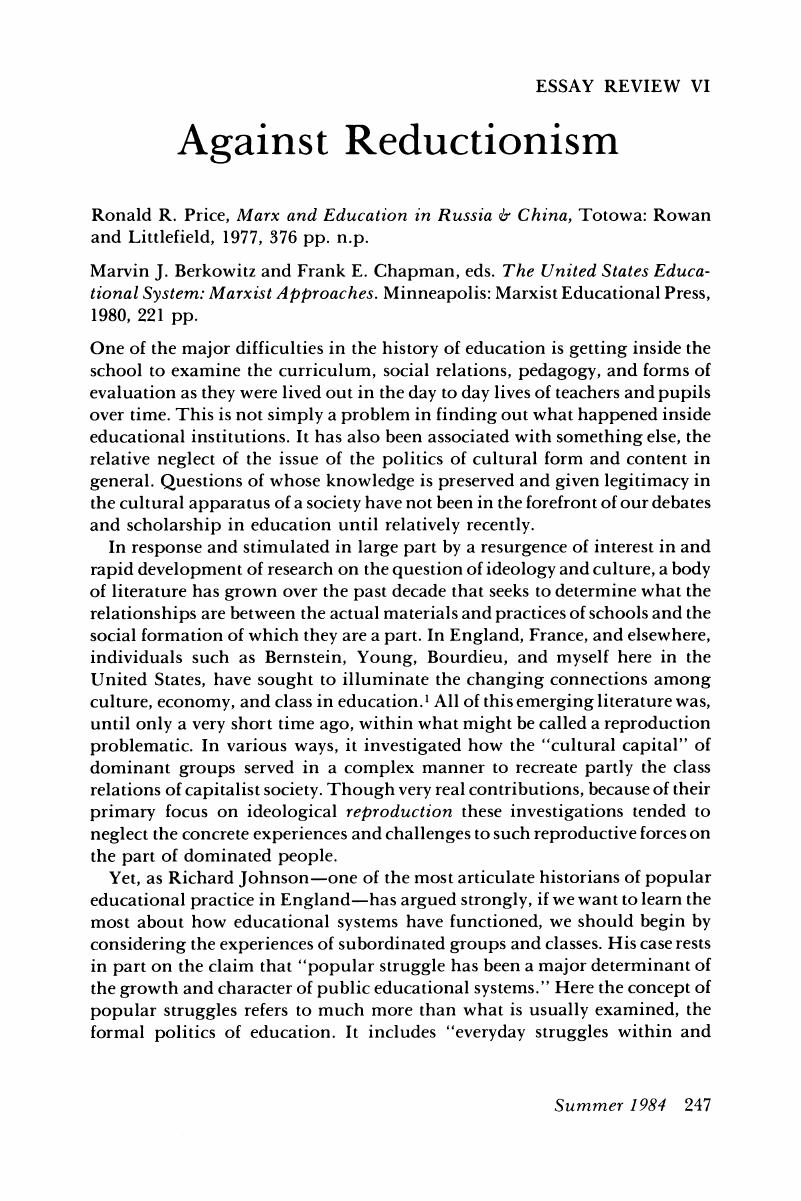Article contents
Against Reductionism
Published online by Cambridge University Press: 24 February 2017
Abstract

- Type
- Essay Reviews
- Information
- Copyright
- Copyright © 1984 by History of Education Society
References
Notes
1. See, for instance, Bernstein, Basil, Class, Codes and Control: Volume 3 (Boston, 1977), Bourdieu, Pierre and Passeron, Jean-Claude, Reproduction in Education, Society and Culture (Beverly Hills, 1977), and Apple, Michael W., Ideology and Curriculum (Boston, 1979).Google Scholar
2. Johnson, Richard, “Education and Popular Politics,” in Society, Education and the State Course Team (eds.), The State and the Politics of Education (Milton Keynes, England, 1981), p. 10. For an insightful historical analysis of how certain kinds of popular struggles helped shape educational practices in the United States, see Reese, William, Progressivism and the Grass Roots (Boston, forthcoming).Google Scholar
3. For a review of these debates, see Apple, Michael W., (ed.), Cultural and Economic Reproduction in Education: Essays on Class, Ideology and the State (Boston, 1982).Google Scholar
4. Karabel, Jerome and Halsey, A. H. (eds.) Power and Ideology in Education (New York, 1977).Google Scholar
5. The tendency for some marxist perspectives to degenerate into forms of positivism and scientism is not inconsequential historically. There are positions within marxist theory, however, that expressly reject such claims. For further discussion, see Keat, Russell and Urry, John, Social Theory as Science (Boston, 1975) and Hindess, Barry, The Use of Official Statistics in Sociology (London, 1973).Google Scholar
6. See Reese, , Progressivism and the Grass Roots. Google Scholar
7. Hogan, David, “ Education and Class Formation: The Peculiarities of the Americans ,” in Apple, Michael W. (ed.), Cultural and Economic Reproduction in Education: Essays on Class, Ideology and the State (Boston, 1982), p. 52.Google Scholar
8. See, for instance, Williams, Raymond, Marxism and Literature (New York, 1977) and Thompson, E. P., The Poverty of Theory (London, 1978). A good deal of this antimechanistic program is outlined in Sumner, Colin, Reading Ideologies (New York, 1979).Google Scholar
9. Johnson, , “Education and Popular Politics,” p. 17.Google Scholar
10. See Hall, Stuart, “Rethinking the ‘Base and Superstructure’ Metaphor,” in Bloomfield, Jon (ed.), Class, Hegemony and Party (London, 1977), pp. 43–72.Google Scholar
11. Bowles, Samuel and Gintis, Herbert, Schooling in Capitalist America (New York, 1976).Google Scholar
12. This is clearly documented in Willis, Paul, Learning to Labour (New York, 1981), McRobbie, Angela, “Working Class Girls and the Culture of Femininity,” in Women's Studies Group (ed.), Women Take Issue (London, 1978), pp. 96–108, and Everhart, Robert, Reading, Writing and Resistance (Boston, 1983). See also the essays in Apple, Michael W. and Weis, Lois (eds.) Ideology and Practice in Schooling (Philadelphia, 1983).Google Scholar
13. I have analyzed this in much greater detail in Apple, Michael W., Education and Power (Boston, 1982).Google Scholar
14. See Barrett, Michele, Women's Oppression Today (New York, 1980) and Apple, and Weis, , Ideology and Practice in Schooling. Google Scholar
15. This is not meant to imply a conceptual claim that all forms of functionalist arguments are incorrect. For a sophisticated defense of functionalist discourse, see Cohen, G. A., Karl Marx's Theory of History: A Defense (Princeton, 1978).Google Scholar
16. Wright, Erik Olin, Class, Crisis and the State (New York, 1978), Walker, Pat (ed.) Between Labor and Capital (Boston, 1979), Bernstein, , Class, Codes and Control Volume 3, and especially, Szelenyi, Ivan, “Prospects and Limits of Power of Intellectuals Under Market Capitalism” (unpublished paper, Department of Sociology, University of Wisconsin-Madison, 1981).Google Scholar
17. See Apple, , Education and Power. Google Scholar
18. Wright, , Class, Crisis and the State. Google Scholar
19. Wright, Erik Olin, Costello, Cynthia, Hachen, David, and Sprague, Joey, “The American Class Structure” (unpublished manuscript, Department of Sociology, University of Wisconsin-Madison, 1982), pp. 38–39.Google Scholar
20. Barrett, , Women's Oppression Today. See also Apple, Michael W., “Teaching and ‘Women's Work’: An Historical and Ideological Analysis,” Teachers College Record, in press.Google Scholar
- 2
- Cited by


